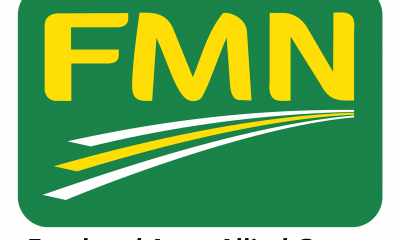Economy
Stock Analysis: Flour Mills Gets Sell Rating

By Christian Orajekwe
Following the conclusion of the N38 billion Rights Issue (RI) and recent discussions with management, we revise our TP and earnings estimates for FLOURMILL. Feedback is that the RI was successful (oversubscribed).
On net, we increase the post-rights shares outstanding by 56% to 4.1 billion and WACC by 158 bps to 15.2% and consequently, (2) lower our TP for the stock by 21% to NGN30.56.
Although we revised our net earnings estimates slightly higher, however, overlaid on the post-rights shares, we now look for 2019E and 2020E EPS of N4.80k (N7.5 ex new shares) and N6.40k (N10 ex new shares) respectively.
FLOURMILL’s share price has accumulated 31% YtD and we revise rating to SELL (HOLD previously) on our new TP.
On our estimates, FLOURMILL is trading on forward (FY18E) P/E and EV/EBITDA multiples of 6.1x and 3.7x respectively, at material discounts to the (1) peer average forward P/E of 11.5x and EV/EBITDA of 7.8x and (2) its five-year historical average of 14x and 8.1x respectively.
Notwithstanding the impact of the RI on valuation and EPS, we have a fairly strong view of FLOURMILL over the medium term. From 1% average between 2014-2016 (2017 was an outlier, in our view) and 5% in 2018E, we forecast sales revenue growth to increase to 9% average over 2019-2020E.
Management has continued to reiterate that its emphasis going forward is on driving returns from the investments of the recent years. And it is our view that the group’s focus on food-based and agro-allied products, whilst favoured by Nigeria’s demographic potential and spending patterns, also provides a good hedge against cyclicality effects in the FMCG industry.
We also forecast EBITDA to grow steadily to N81 billion by 2020E, from N57 billion in 2017FY, and the margin to stabilize at 12% average, 300 bps above the rate achieved in the last five years. With a robust top-line, we view the sustenance of the opex margins of 4.5% achieved in 2017FY and 4% as at 9M-18, compared to 8% historical average, as positive for EBITDA formation going forward.
Management said it does not expect opex-to-revenue ratio to change materially to the upside going forward, given its emphasis of growing revenue, while focusing strongly on containing costs.
On the highly leveraged balance sheet, we are not totally convinced that there will be a material reduction in the amount of FLOURMILL’s borrowings (N201 billion as at 9M-18) over the near term.
That said, we also do not expect borrowings will be higher.
On net, it is our view that savings from the refinancing of expensive borrowings will be positive – in the short term especially – for cash and earnings. Over the medium term, it is our view that faster growth in EBITDA over fixed financing costs will be positive for earnings.
We held discussions with management on the recently commissioned Sunti backward integration project in sugar, and also to understand the current market dynamics and outlook.
Sunti and Golden Penny Sugar in general
We understand that the Sunti project, at commissioning, cost the group about N50 billion, funded with N30 billion of subsidized loans from the Central Bank of Nigeria (CBN) and the balance being own capital. The CBN loan is for twelve years, at 9% average interest rate. The land size is 15,000 hectares, to be utilized solely for planting and refining sugar. Thus far, 3,000 hectares have been developed, but not fully cultivated.
The refinery capacity is currently 100,000 tonnes of sugar per annum. Further expansion of capacity, according to management, is dependent on profitability. Management said it expects to achieve the first farm-to-factory output in the next 2-3 years. The refinery will be fed with own-grown sugarcane at the early stage but will subsequently be supported with supplies from outgrowers. We understand that sales will be largely to industrial consumers.
Management said the 750,000 tonnes per annum sugar refinery in Lagos will be retained and fed with imported raw sugar. It does not consider the movement of raw sugar from the North for refining in Lagos efficient. And it also does not consider the mandatory backward integration policy in the sector sufficient a threat – in the near term at least – to the continuity of the import-to-refinery model.
Capacity utilization on the 750,000 tonnes refinery is currently 45%. We were informed that the sugar business is profitable, accounting for about 15% of both group revenue and net profit. Although DANGSUGAR, the market leader, sets sugar prices, FLOURMILL management said it is able to derive about the same margin on its sugar, on average, as with DANGSUGAR (five-year average of 20% and 25.4% as at 9M-17). We were curious about the potential margin benefits derivable from Sunti, but management’s response, however, did not convince us enough to conclude that there will be material improvement.
Currently, the group’s sugar sales mix is 80% industrial and 20% retail (both cubes and refined 100g bags). Management said the margin on retail sugar sales is about 300 bps more, and that its mix is expected to improve only slightly above 20%.
Only small quantity of sugar is currently exported, and to neighbouring ECOWAS countries. Given the local excess sugar capacity, management sees good opportunity in exports, but – as with DANGSUGAR – we are not convinced that this aspiration will be pursued aggressively.
On Debt
Gross debt as at 9M-18 was N201 billion, from N234 billon at the beginning of the year. As with previous guidance, management said it plans to reduce outstanding debt by 2019 (1) using the proceeds of the N38 billion Rights Issue and (2) via reduction of capex spending, by limiting them to only strategic investments (N20 billion capex guidance provided for 2019E, vs. N10 billion in 9M-18).
We are not convinced that FLOURMILL’s outstanding debt in the next 2-3 years will be materially lower from what it is now. Management said its target is to achieve debt-to-EBITDA ratio of 1.5x, from c.6x average in the last five years. But this, in our view, can also be achieved by growing EBITDA (as we expect), and not necessarily by cutting down borrowings. Management said it is keen about being adequately capitalized/liquid.
Management confirmed that it has been quite busy in the debt market, refinancing its borrowings at lower interest rates. Gross outstanding debt, we understand, currently consists of about N25 billion of commercial papers (CPs), some of which were recently issued at 15% average interest rate (average rate on CPs was 21% as at 9M-18).
Overall, target is to achieve 15-16% average interest rate on gross short term borrowings by 2019E (from 19.8% average as at 9M-18), should local inflationary condition continue to improve.
Business Segments
Food – Feedback is that this segment remains resilient. Performance is driven by volume and mix, led by flour, semovita, and pasta. Target is to achieve 10% volume growth in 2019E.
Agro-Allied – As a result of losses associated with Sunti start-up costs as well as ROM Oil (edible oil), this segment is expected to close 2018 with negative PBT. However, remedial actions going into 2019 include (1) to reduce capex in Sunti and (2) for edible oil, to control costs and improve both pricing and RTM, with the target to achieve break-even, at minimum.
Also, on agro-allied, we were informed that (1) the export of garri commenced recently, (2) a second aqua feed will be commissioned in Q2-Q3 this year, and (3) the fertilizer business is performing well, notwithstanding the threat of government supplying the product at subsidized prices. Overall, for this segment, target is to achieve 7-10% volume growth in 2019E.
Packaging – Thus far, the performance of this segment is consistent with the trend seen over 9M-18 (150% PBT growth). Management said the revenue growth of 3% achieved in 9M-18 was strictly from third-party sales, guiding that inter-company sales cancel out at the group level. Emphasis remains on controlling costs.
Prices: In the absence of the 2016-type of cost pressure, prices are expected to remain stable. There was a very marginal cut in the prices of sugar and flour late in 2017. On gross margin outlook, management said it is comfortable with the 13% it achieved in 9M-18.
Withheld products – Daily Delight (breakfast cereal) and Kool 2-Go (instant powdered drink) were recently withheld. Management said Daily Delight could not compete in the breakfast cereal market while Kool 2-Go was affected by the naira devaluation. We understand plan is ongoing to reposition and relaunch the breakfast cereal this year.
Power – Gas supply has improved significantly across the various plants (Ibadan, Iganmu, and Calabar), but excluding Apapa, wherein supply (we understand is currently in the 60-70s) is limited by high demand.
Forex – Less than 50% of FX requirement is met via the CBN’s bi-monthly sales, at slightly above N325/USD. All demands can be met at the Investors and Exporters window. Management’s view of the FX market is positive in the short term, suggesting losses linked to the outstanding USD borrowings (USD20 million) and trade payables are unlikely.
Christian Orajekwe is analysts at CORDROS CAPITAL and can be reached via [email protected].
Economy
Naira Retreats to N1,366.19/$1 After 13 Kobo Loss at Official Market

By Adedapo Adesanya
The value of the Naira contracted against the United States Dollar on Friday by 13 Kobo or 0.01 per cent to N1,366.19/$1 in the Nigerian Autonomous Foreign Exchange Market (NAFEX) from the previous day’s value of N1,366.06/$1.
According to data from the Central Bank of Nigeria (CBN), the Nigerian currency also depreciated against the Pound Sterling in the same market window yesterday by N2.37 to N1,857.75/£1 from the N1,855.38/£1 it was traded on Thursday, and further depleted against the Euro by 57 Kobo to close at N1,612.52/€1 versus the preceding session’s N1,611.95/€1.
In the same vein, the exchange rate for international transactions on the GTBank Naira card showed that the Naira lost N8 on the greenback yesterday to N1,383/$1 from the previous day’s N1,375/$1 and at the black market, the Nigerian currency maintained stability against the Dollar at N1,450/$1.
FX analysts anticipate this trend to persist, primarily influenced by increasing external reserves, renewed inflows of foreign portfolio investments, and a reduction in speculative demand.
In the short term, stability in the FX market is expected to continue, supported by policy interventions and improving market confidence.
Nigeria’s foreign reserves experienced an upward trajectory, increasing by $632.38 million within the week to $46.91 billion from $46.27 billion in the previous week.
The Dollar appreciation this week appears to be largely technical, serving as a correction to the substantial losses experienced from mid- to late January.
Meanwhile, the cryptocurrency market slightly appreciated, with Bitcoin (BTC) climbing near $68,000, up nearly 5 per cent since hitting $60,000 late on Thursday after investor confidence in crypto’s utility as a store of value, inflation hedge, and digital currency faltered.
The sell-off extended beyond crypto, with silver plunging 15 per cent and gold sliding more than 2 per cent. US stocks also fell.
The latest recoup saw the price of BTC up by 4.7 per cent to $67,978.96, as Ethereum (ETH) appreciated by 6.3 per cent to $2,021.10, and Ripple (XRP) surged by 9.5 per cent to $1.42.
In addition, Solana (SOL) grew by 7.3 per cent to $85.22, Cardano (ADA) added 6.1 per cent to trade at $0.2683, Dogecoin (DOGE) expanded by 5.4 per cent to $0.0958, Litecoin (LTC) rose by 5.2 per cent to $53.50, and Binance Coin (BNB) jumped by 2.3 per cent to $637.79, while the US Dollar Tether (USDT) and the US Dollar Coin (USDC) traded flat at $1.00 each.
Economy
Oil Prices Climb on Worries of Possible Iran-US Conflict

By Adedapo Adesanya
Oil prices settled higher on Friday as traders worried that this week’s talks between the US and Iran had failed to reduce the risk of a military conflict between the two countries.
Brent crude futures traded at $68.05 a barrel after going up by 50 cents or 0.74 per cent, and the US West Texas Intermediate (WTI) crude futures finished at $63.55 a barrel due to the addition of 26 cents or 0.41 per cent.
Iran and the US held negotiations in Muscat, the capital of Oman, on Friday to overcome sharp differences over Iran’s nuclear programme.
It was reported that the talks had ended with Iran’s foreign minister saying negotiators will return to their capitals for consultations and the talks will continue.
Regardless, the meeting kept investors anxious about geopolitical risk, as Iran wanted to stick to nuclear issues while the US wanted to discuss Iran’s ballistic missiles and support for armed groups in the region.
Any escalation of tension between the two nations could disrupt oil flows, since about a fifth of the world’s total consumption passes through the Strait of Hormuz between Oman and Iran.
Saudi Arabia, the United Arab Emirates, Kuwait and Iraq export most of their crude via the strait, as does Iran, which is a member of the Organisation of the Petroleum Exporting Countries (OPEC).
According to Reuters, Iran objected to the presence of any US Central Command (CENTCOM) or other regional military officials, saying that would jeopardise the process.
The current confrontation was sparked by more than two weeks of unrest in Iran that saw authorities launch a deadly crackdown that killed thousands of civilians and shocked the world. As reports of the deaths trickled out of Iran, US President Donald Trump threatened to strike Iran if any of the tens of thousands of protesters arrested were executed.
Meanwhile, Kazakhstan’s planned oil exports could fall by as much as 35 per cent this month via its main route through Russia, as the country’s top oil company, Tengiz oilfield, slowly recovers from fires at power facilities in January.
ING analysts have pointed out Iran’s neighbour, Iraq, and a disagreement with the US as another bullish factor for oil prices. It seems Iraqi politicians favour Mr Nouri al-Maliki as the country’s next Prime Minister, but the US thinks Mr al-Maliki is too close to Iran. President Trump has already threatened the oil producer with consequences if he emerges as PM.
Economy
Adedeji Urges Nigeria to Add More Products to Export Basket

By Adedapo Adesanya
The chairman of the Nigeria Revenue Service (NRS), Mr Zacch Adedeji, has urged the country to broaden its export basket beyond raw materials by embracing ideas, innovation and the production of more value-added and complex products
Mr Adedeji said this during the maiden distinguished personality lecture of the Faculty of Administration, Obafemi Awolowo University (OAU), Ile-Ife, Osun State, on Thursday.
The NRS chairman, in the lecture entitled From Potential to Prosperity: Export-led Economy, revealed that Nigeria experienced stagnation in its export drive over three decades, from 1998 to 2023, and added only six new products to its export basket during that period.
He stressed the need to rethink growth through the lens of complexity by not just producing more of the same stuff, lamenting that Nigeria possesses a high-tech oil sector and a low-productivity informal sector, as well as lacking “the vibrant, labour-absorbing industrial base that serves as a bridge to higher complexity,” he said in a statement by his special adviser on Media, Dare Adekanmbi.
Mr Adedeji urged Nigeria to learn from the world by comparative studies of success and failure, such as Vietnam, Bangladesh, Indonesia, South Africa, and Brazil.
“We are not just looking at numbers in a vacuum; we are looking at the strategic choices made by nations like Vietnam, Indonesia, Bangladesh, Brazil, and South Africa over the same twenty-five-year period. While there are many ways to underperform, the path to success is remarkably consistent: it is defined by a clear strategy to build economic complexity.
“When we put these stories together, the divergence is clear. Vietnam used global trade to build a resilient, complex economy, while the others remained dependent on natural resources or a single low-tech niche.
“There are three big lessons here for us in Nigeria as we think about our roadmap. First, avoiding the resource curse is necessary, but it is not enough. You need a proactive strategy to build productive capabilities,” he stated, adding that for Nigeria, which is at an even earlier stage of development and even less diversified than these nations, the warning is stark.
“Relying solely on our natural endowments isn’t just a path to stagnation; it’s a path to regression. The global economy increasingly rewards knowledge and complexity, not just what you can dig out of the ground. If we want to move from potential to prosperity, we must stop being just a source of raw materials and start being a source of ideas, innovation, and complex products,” the taxman stated.
He added that President Bola Tinubu has already begun the difficult work of rebuilding the economy, building collective knowledge to innovate, produce, and build a resilient economy.
-

 Feature/OPED6 years ago
Feature/OPED6 years agoDavos was Different this year
-
Travel/Tourism9 years ago
Lagos Seals Western Lodge Hotel In Ikorodu
-

 Showbiz3 years ago
Showbiz3 years agoEstranged Lover Releases Videos of Empress Njamah Bathing
-

 Banking8 years ago
Banking8 years agoSort Codes of GTBank Branches in Nigeria
-

 Economy3 years ago
Economy3 years agoSubsidy Removal: CNG at N130 Per Litre Cheaper Than Petrol—IPMAN
-

 Banking3 years ago
Banking3 years agoSort Codes of UBA Branches in Nigeria
-

 Banking3 years ago
Banking3 years agoFirst Bank Announces Planned Downtime
-

 Sports3 years ago
Sports3 years agoHighest Paid Nigerian Footballer – How Much Do Nigerian Footballers Earn




















